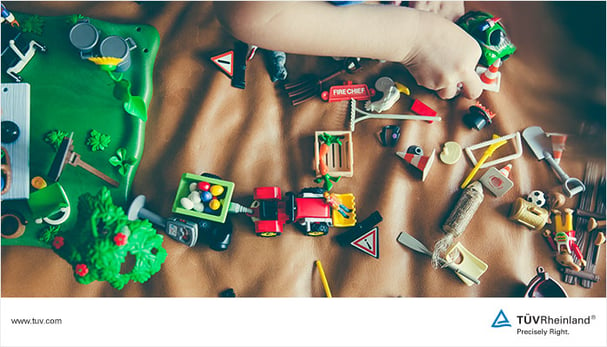Christmas means joy and gifts. Of course, we don’t want any safety issues to spoil the cheer. As children of all ages are coming up with their wish lists, we see a buying spree in toy shops and shopping malls with the approaching of the yuletide season. However, are your or your children’s dreamed toys safe? Are there potential risks in the lovely gifts you buy for your kids? Let TÜV Rheinland give you a professional but easy to understand overview of toy safety.
Situation requires close attention
The Rapid Exchange of Information System (RAPEX) is the EU rapid alert system for unsafe consumer products and consumer protection. According to the weekly notification on current RAPEX alert, total 409 RAPEX notifications had been reported on toys from different EU countries in 2015 as of 20th November. China was the major country of origin with 368 notifications. Spain is the major notifying country with 81 notifications, Czech Republic with 40 notifications, and France with 34 notifications.
Among all the notifications on toys, chemical and choking were the top risks, with 178 notifications reported with chemical risks and 162 choking hazards.
Di (2-etylhexyl) phthalate (DEHP), prohibited in all toys and childcare articles according to REACH Regulation, has become the major risk in toys. There was a China-made plastic doll set that tested to contain DEHP 54.1% by weight, the highest amount measured from toys while the allowed phthalate limit in the EU is only 0.1%.
Make sure that your baby's toys are not small enough to be a choking hazard and that they can't break apart into small dangerous pieces. Soft toys, dolls and toy guns contains small parts must strictly adhere to requirements of the Toy Safety Directive and relevant regulations. Small children may choke while putting small parts into in his/her mouth.
Professional advice
Stay away from toxic products. First of all, do not choose toys with bright colors, which might contains high lead or cadmium content. Second, plastic toys and soft toys require high attention as they might contain a high level of phthalate that interferes with the endocrine system.
Check the safety certification. According to safety standards in most of the developed countries, products must acquire required safety certifications before they are sold on the market. Some toy manufacturers apply for the “Toy Proof” certification from TÜV Rheinland, the world’s leading provider of inspection, testing and certification services. Products with this kind of certifications are safer compared to products featured with basic safety marks.
Pay attention to safety during use. Warning labels on toys should be paid attention to. Usually there is a leaflet or instruction for us that tells consumers how to avoid choking hazards and other harms. Parents should check the leaflet and instruction carefully before giving the toys to your kids.
Pick up branded products. Based on the tests carried out by TÜV Rheinland, samples from large brand-name companies rarely have excessively high levels of hazardous substances.
Christmas is a gift-giving season full of pleasant surprises. Have a Safe, Healthy and Happy Christmas!
For more information on our product testing and certification solutions, please visit our website or contact us to speak to one of our experts.




